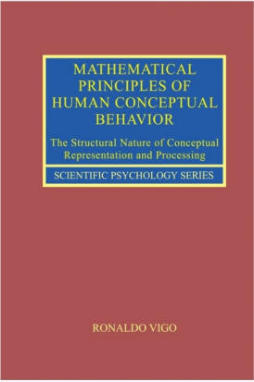Dr. Ronaldo Vigo

Dr. Ronaldo Vigo
Dr. Ronaldo Vigo
Director
Research Interests:
Although I am interested in many areas of cognitive research, the core of my work focuses on the development of mathematical and computational models of concept learning and categorization behavior. For example, I have investigated the degree of difficulty that humans experience when learning different types of concepts. Two key questions drive this research. First, why are some types of concepts more difficult to learn than others? Secondly, can the subjective degree of learning difficulty of these concepts be reliably predicted? In my work, I argue that the key to answering these questions lies on the structural properties of the categorical stimulus from which a concept is learned and on specific mental operations that facilitate their detection.
Toward this end, I have developed several mathematical frameworks for characterizing and measuring the structural properties inherent to concepts. Historical and new empirical evidence suggests that these structural models -- algebraic, analytic, and deterministic in nature (and hence, much like the models encountered in classical physics) -- are more robust and cognitively plausible predictors of the degree of concept learning difficulty experienced by humans than the well-known alternatives. Notably, all of this is accomplished with few or no parameters. This research has been articulated in several papers and in a book entitled "Mathematical Principles of Human Conceptual Behavior" (Vigo, 2006, 2008, 2009, 2011, 2013, 2014).
The SCOPE LAB (Structure, Concepts, and Perception Laboratory) at Ohio University seeks to extend the above research empirically and theoretically. For example, in the SCOPE Lab we conduct empirical and theoretical research on human concept learning and categorization behavior using eye tracking technology. More specifically, we use eye tracking techniques to explore correlations between saccades and the concept learning behavior predicted by a variety of models, including my concept invariance models (Vigo, 2009, 2011, 2013). Other research activities in the SCOPE Lab include empirical and theoretical research on decision making behavior as a function of similarity assessment, dissimilarity assessment, and categorization. Also, we are interested in researching how humans judge similarity and dissimilarity between structural or configural stimuli such as human faces. In related work, I introduced a mathematical model of similarity that predicts the empirical similarity ordering of a key class of configural stimuli associated with deductive inference (Vigo, 2009a, 2009b). Last, but not least, the SCOPE Lab conducts empirical and theoretical research on problem solving behavior in mathematical domains such as geometry, algebra, and physics, and on the nature of aesthetic judgments.
RECENT BOOK BY RONALDO VIGO: 
Mathematical Principles of Human Conceptual Behavior, Scientific Psychology Series; Routledge, Taylor and Francis.
FOR BOOK’S WEBSITE (CLICK HERE)NEW PAPERBACK VERSION AVAILABLE!
